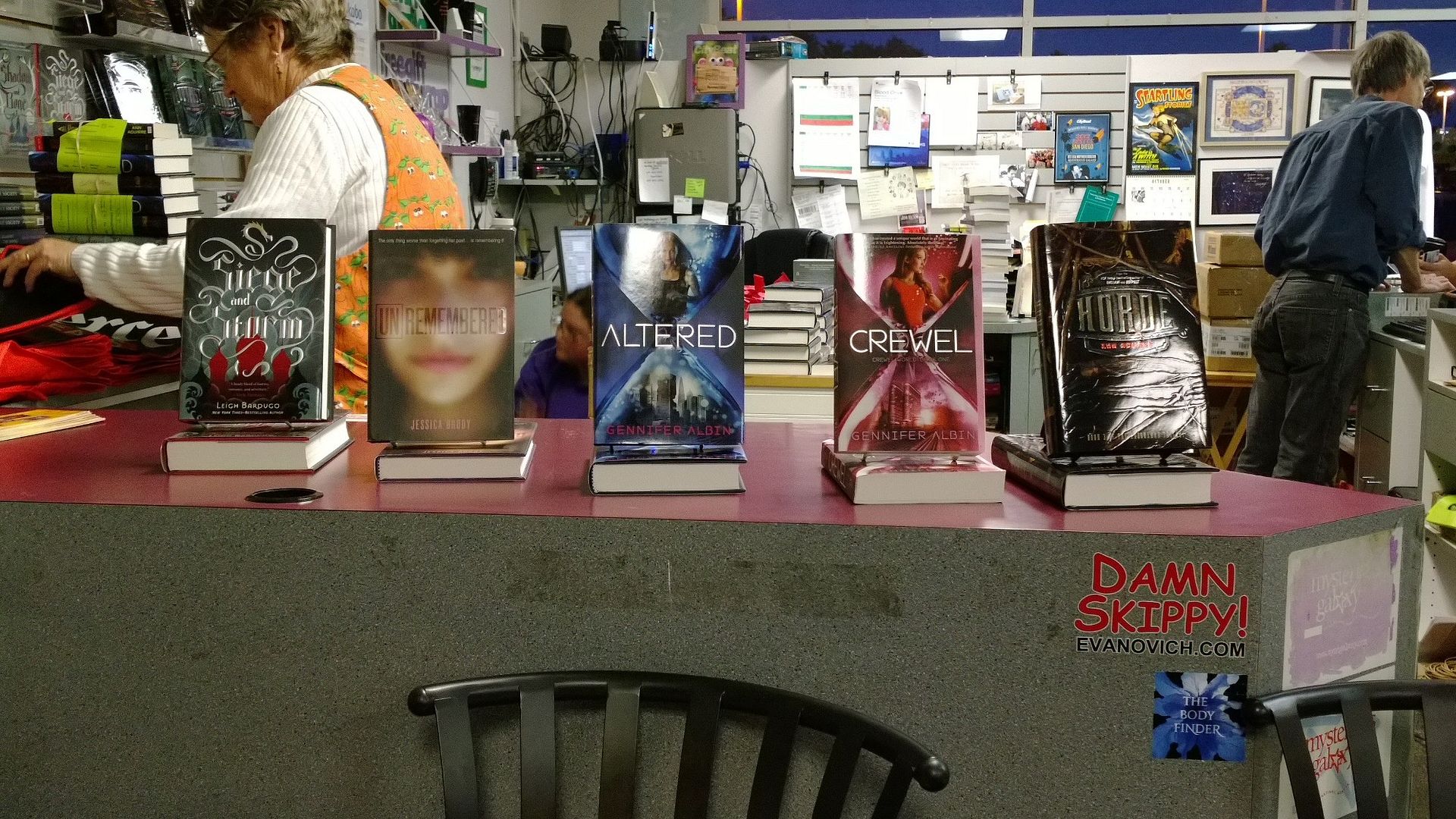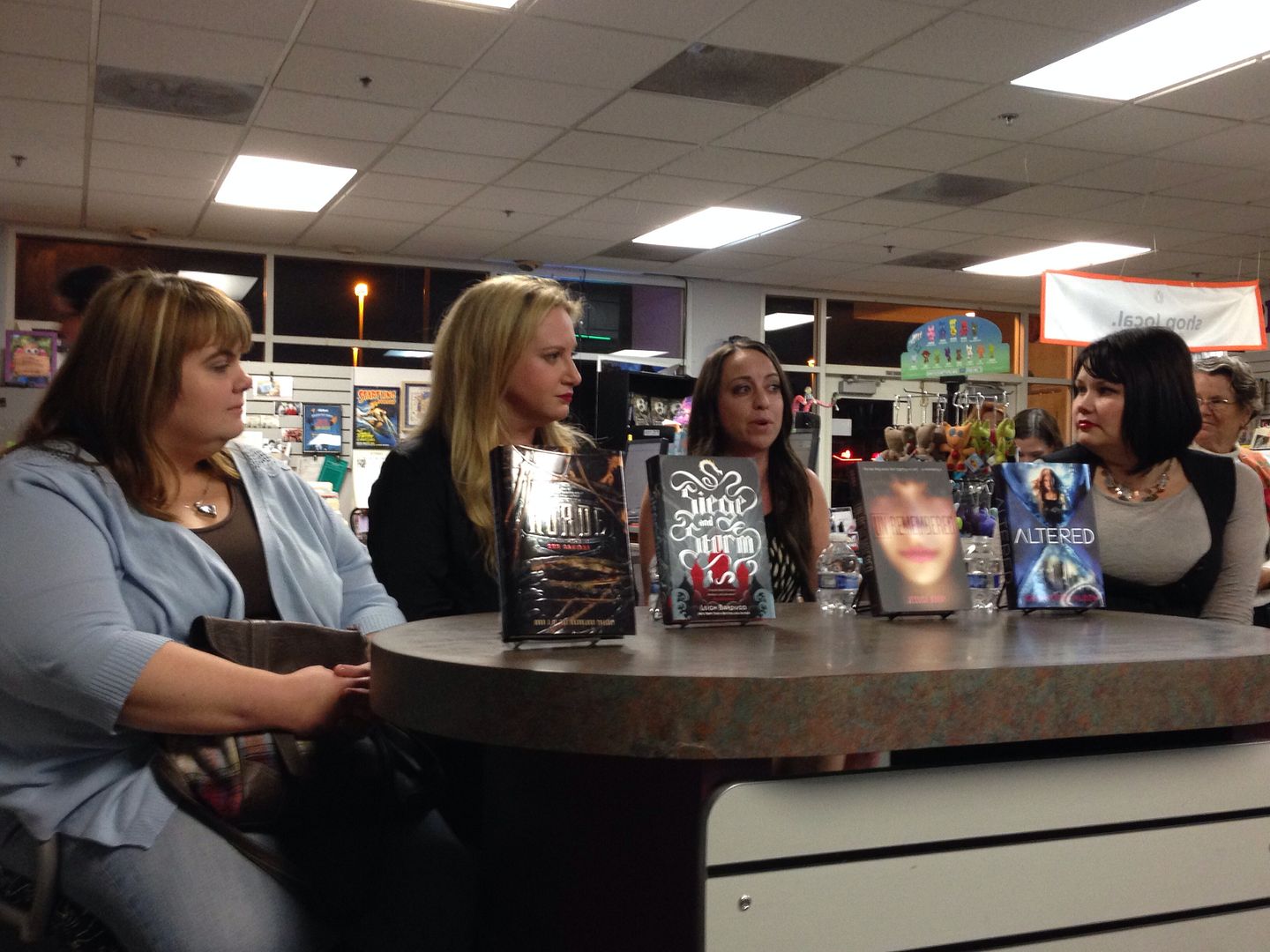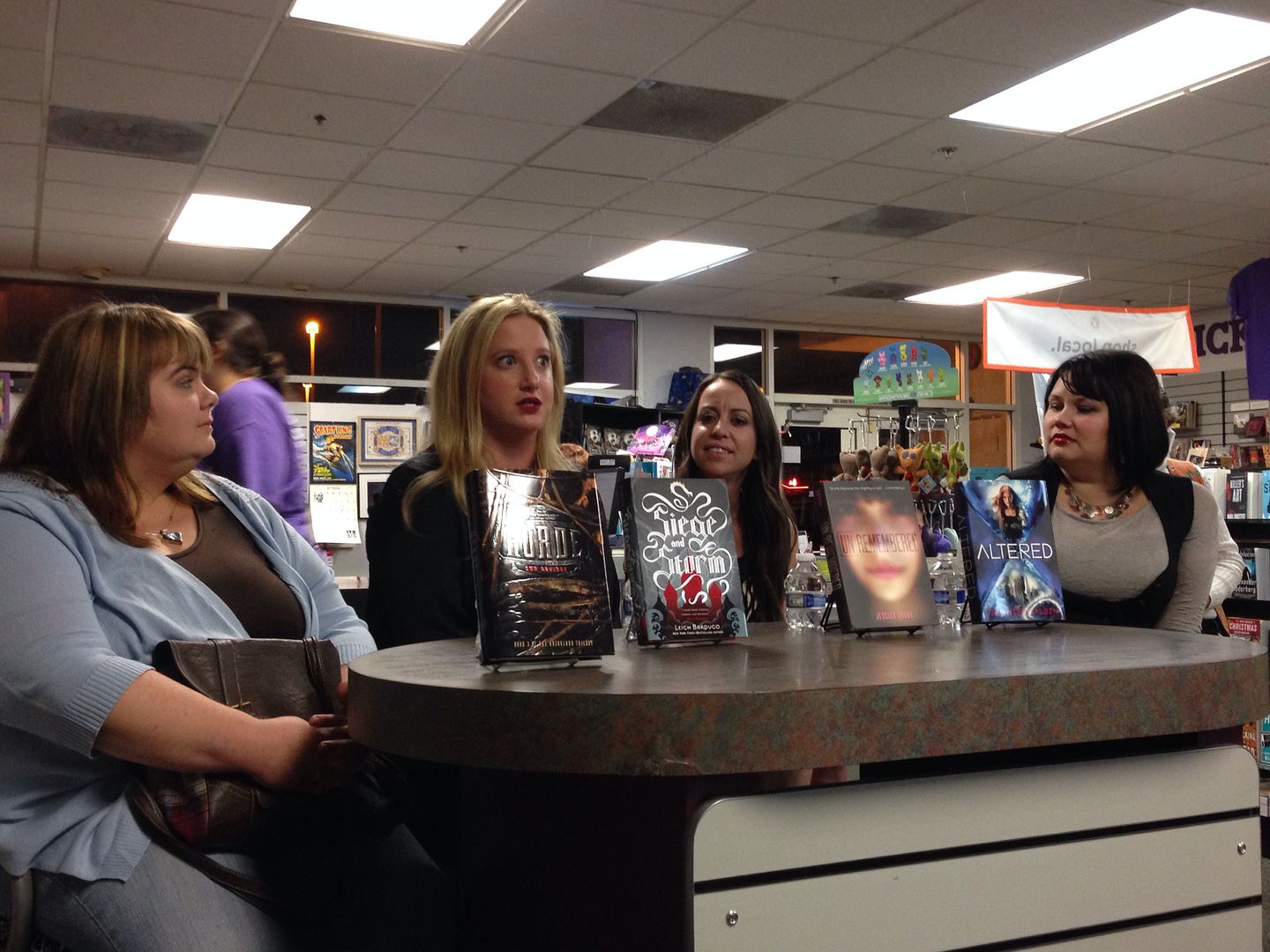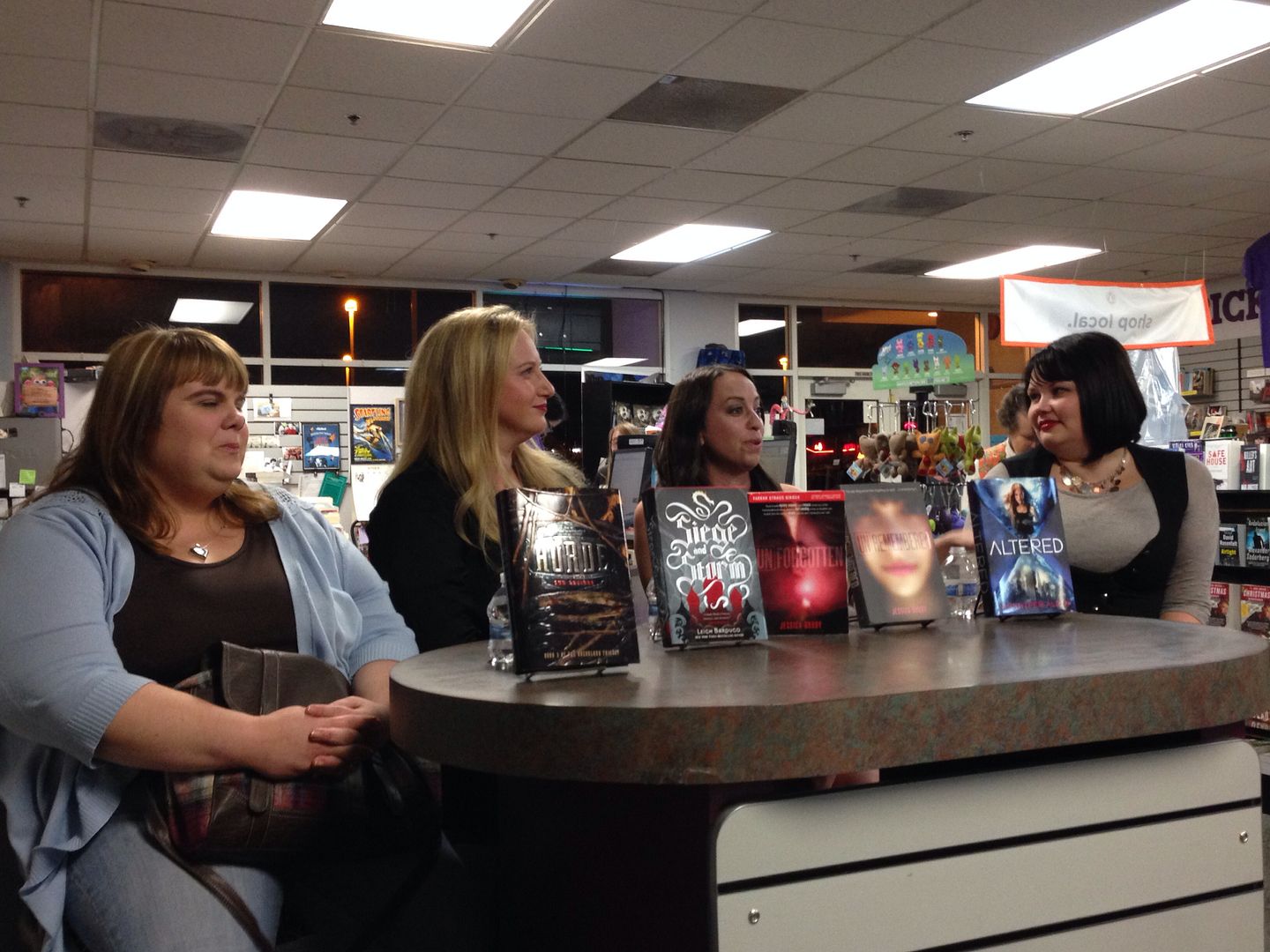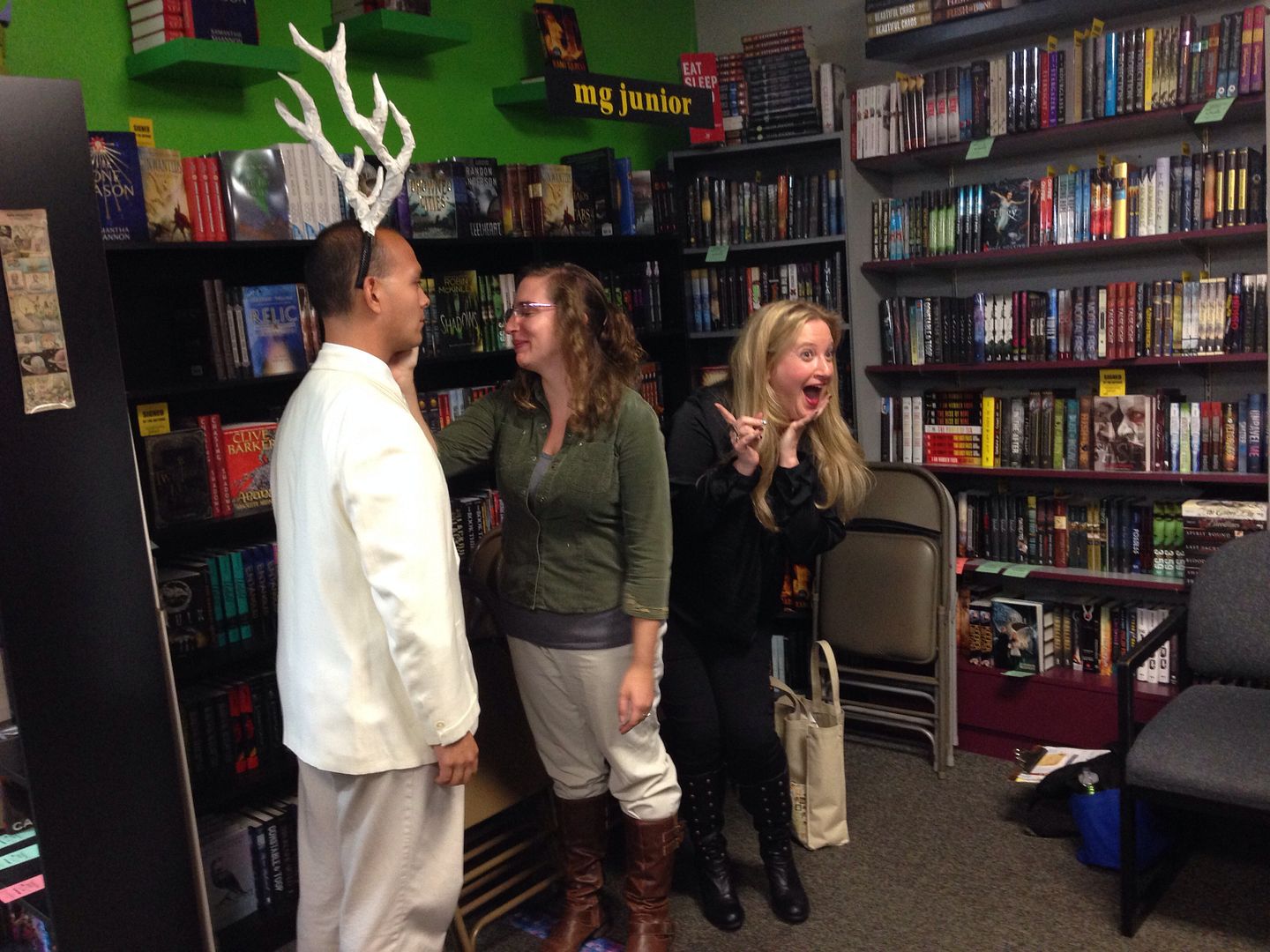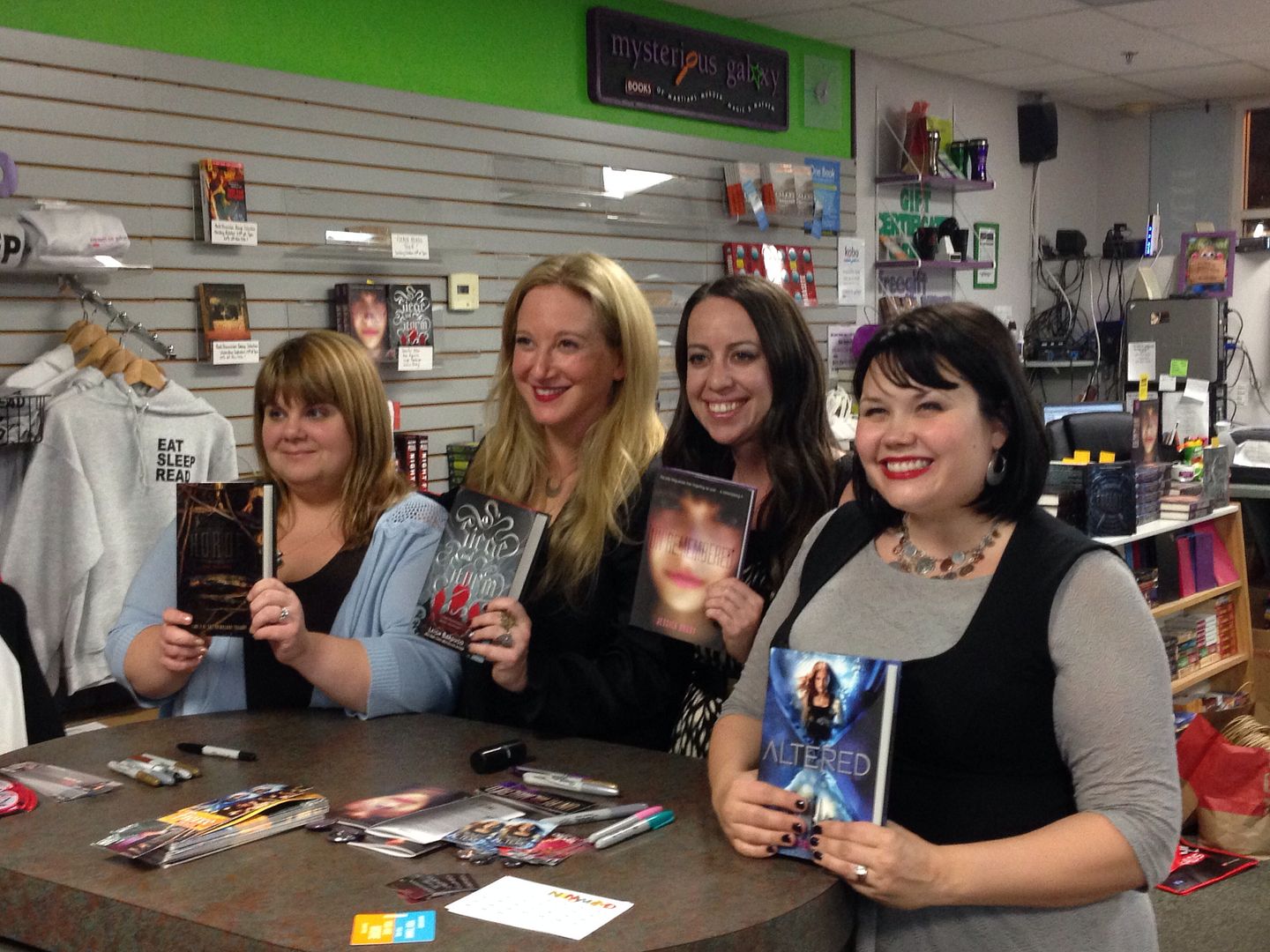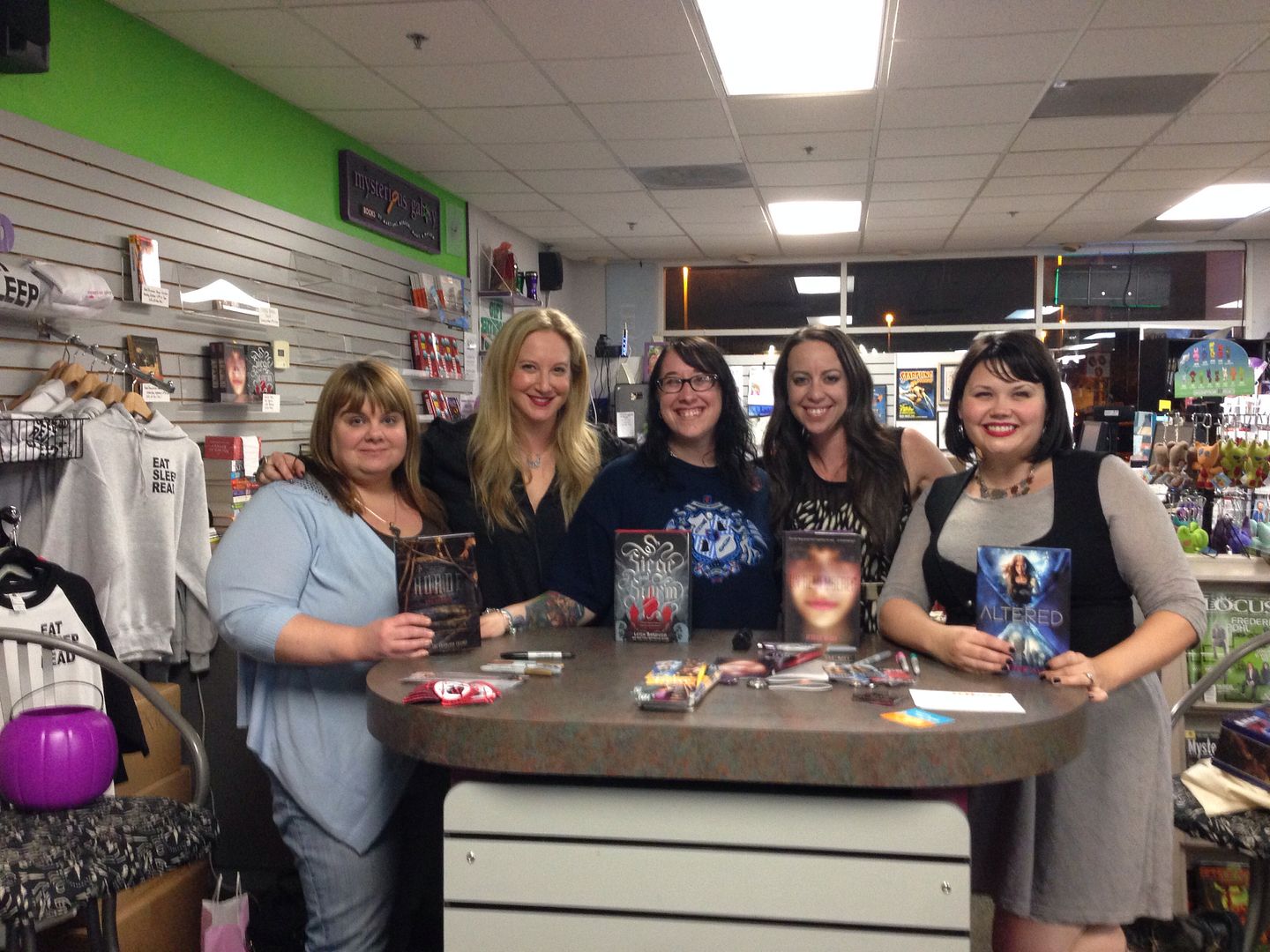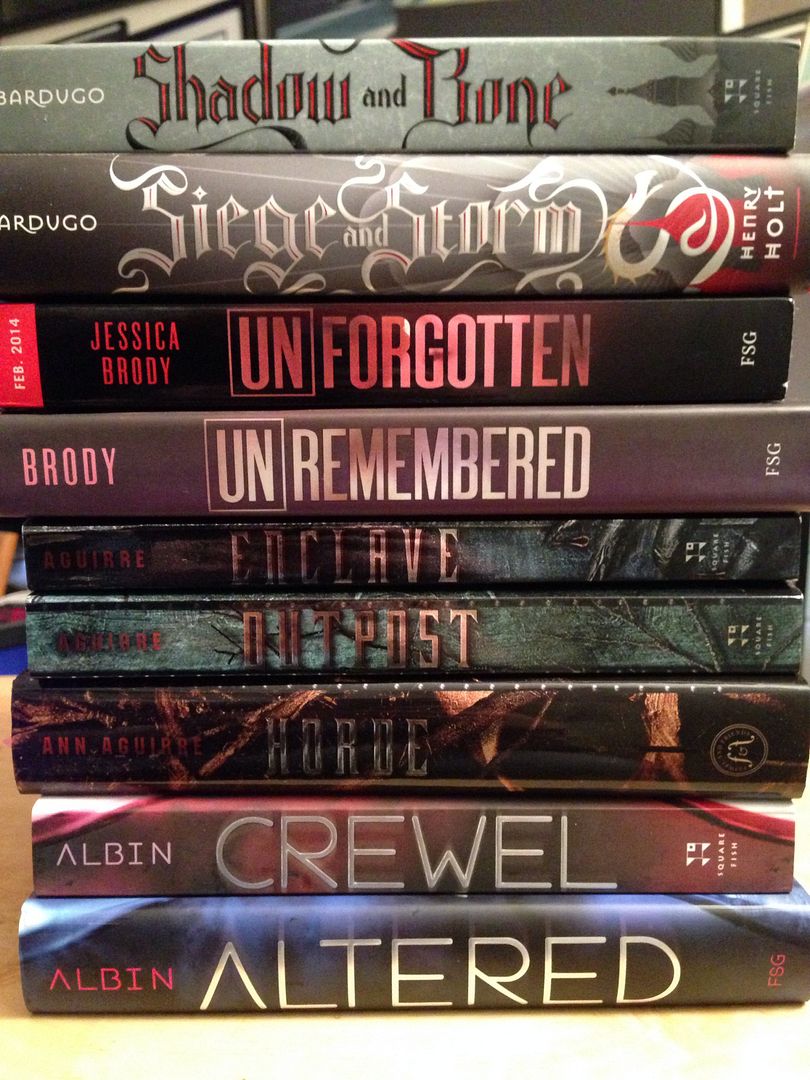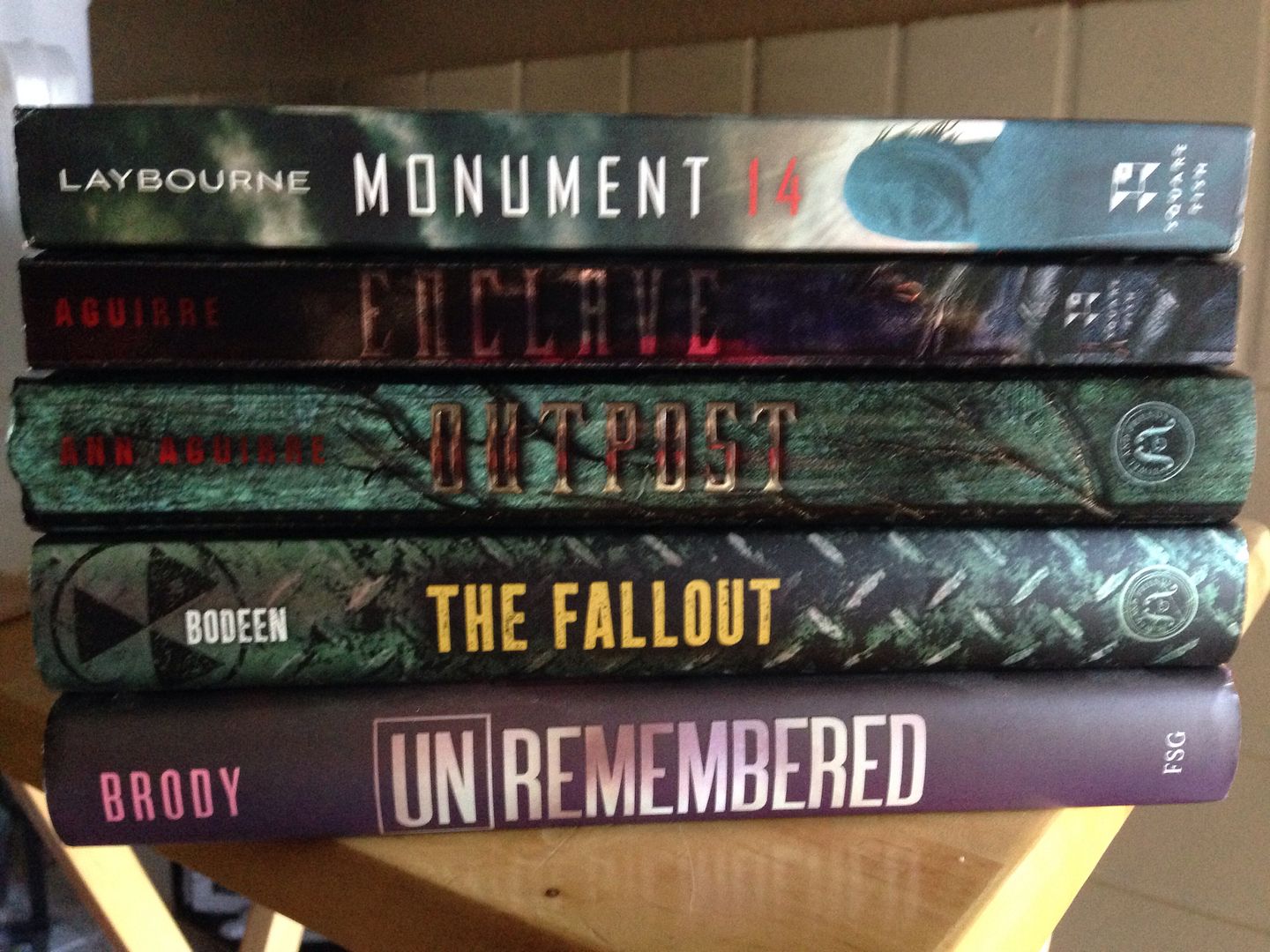When the Fierce Reads tour was announced as with a stop in San Diego, it was a sure thing. And then Macmillan asked me to be designated blogger and sent me a box filled with pretty books to giveaway AND set me up with an interview time with the authors. I met Michelle at Starbucks, as usual. We took over a couple of tables and waited until the ladies showed.
Everyone showed up just after six. We decided to sit outside to not irritate the inside guests.
As with the last interview I did, I intended to record this and then figure out some way to make it a sound file for you to choose whether or not you wanted to listen. As I am complete and total fail at technology, instead there is a wall of text. And to keep the wall of text as small as possible, I kept out all of the tangents and giggles. Just believe me when I say these four women are hilarious. If you want to get straight to the event, scroll past the block quote.
What’s the hardest book to write: your first or your last?
G: The second. They buy a finished book and are like, “You’re amazing!” and then you turn in your second one and they’re like, “Wellllllll….we’ve revised our opinion.” No, I’m joking, but I couldn’t count on my hands anymore how many people I know who have had to rewrite their second book and I was one of them. I flew through the third book and it got through revisions really fast and everyone loved it. So for me, it was the second book.J: I would have said the second book about three months ago, until I started writing the third book and it is impossible. I think the problem with the third book is that you have to solve every problem that you set up. And through out, I’ve been very nice to my future self, going “Oh, future Jessica will deal with that. I’m going to set it up here and then she’s going to solve it in a really cool way in the third book.” Now I’m getting to those problems and I’m like, “Damn you, past Jessica!” so I’m going to say the third one.L: Book two was the most intense, but book three was the most challenging. I thought it was going to be the easiest because I had everything mapped out and I thought it would be the fun part. I knew where everything was going and I thought I would just enjoy myself. And it could not have been less true. I think that in books one and two, you’re opening doors and in book three, you’re closing doors. For me, that was sort of a new experience and not one that I enjoyed.A: If you’re comparing the first book to the last, I think they each have their challenges. The new idea is always sexiest. You run with it, you can do anything you want and it doesn’t matter how crazy it is because the sky is the limit. But, like Jessica said, in the third book, you absolutely have to make everything make sense and if you weren’t completely logical with some of your decision making, you have to deal with those consequences. By the same token, I didn’t really have a hard time with the first or the third book.
With the first book, there was no expectation. I wrote the YA because my kids were bugging me to write a book that they could read. I just wrote it to have fun and with book two, I was kind of freaked out. I didn’t really expect that it would sell and then it did. And then it did kinda well and then it did better and people were excited for the second one. That’s when I realized that I was going to have to make lightening strike twice.
So, for me, I’d have to say that Outpost was the hardest to write because I was struggling with the weight of reader expectations and I was afraid that they wouldn’t like it as much. I couldn’t, from a plot sense, duplicate the excitement of discovery from Enclave because everything is brand new. In Outpost, you’re returning to the world, they’re getting the second look and maybe they’ll look a little closer. What I tried to do instead of offering breakneck, relentless action was I tried to intersperse that with more emotional development and emotional growth. Some people called that book slower, in comparison. Some people liked that and said that it was good to get to know the characters and care about them. It was an absolutely necessary maneuver because if you don’t care about the characters, you don’t care when I raise the stakes in book three. So, for me, book two was the toughest.
What is the most stressful thing about writing?
G: When you get out of the habit of doing it. I’m always like, “Oooh, I finished a book, I’m going to take a week off. I’ll start all of these sewing projects and I’ll bake things and I’ll take care of the children for once and I’ll clean my house.” The next thing you know, I’ve turned into some domestic person, which is not me. And then I’m like, “How do I write again? What do I do? What is a computer?” That is the hardest thing, just getting back into a groove if I left myself stop.
J: I think one of the most stressful things is when you sell a book on proposal. When I write a proposal, I feel like a rock star. They buy it and I’m thinking, “This is going to be EPIC!” You get to put all of the really cool stuff in a proposal, but you don’t have to put all of the garbage that gets in the way of the cool stuff. Every time I turn in a book, I think they’re going to say it isn’t the book they bought.
A: If I can dovetail or piggy back or whatever on that answer, I hate selling on proposal. I find it stressful for slightly different reasons. Generally, I’m really excited when I write the proposal and the sample chapters and then I just want to finish it. But then, I have to send it away and I have to wait. I’ll have other deadlines, but eventually I’ll hear back. They’re going to buy it, but they don’t actually need it until December, 2016;, so the book I’m really excited about, I can’t write right now. By the time December comes along, I don’t even want to write it any more. I don’t even know what I was thinking or where I was trying to go with it.
L: For me, I have a very strong streak of self-doubt and that is sort of with me through everything. On the days where it gets the better of me, those are the worst days. Those are the days where I feel like a hack and a fraud and I regret every negative review I ever read because I have all of those voices that are like a Greek chorus saying, “That’s right, you’re terrible!”
What do you like more: drafting or revising?
G: Whatever I’m not doing at the time. “Oh, if only I were drafting and I could just create and I didn’t have any notes!” When I’m drafting then it’s, “This is terrible! When I revise, everything will be magical and I’ll make everything beautiful!”
L: I like drafting more.
J: I like drafting more. Until about three months ago, when I started something called Book Three.
A: I say revising. It takes so much more mental energy for me to create something out of nothing. Once I have a book, even if it’s kind of crappy, I can work on it and work on it and work on it and I can make it not crappy. It’s not as exhausting because I have a place to start.
Is it ever too late to start writing?
L: This actually drives me insane. Ask someone who didn’t manage to write their first book until “late in life”. No, it’s not too late. I think one of the problems we have, not just in publishing, but in everything is this weird sort of festishization of youth and being the first to discover a talent. The fact is that there are a lot of writers and artists and even actors who started later in life. The only issue is that, if you’re anything like me, you feel like you’re going to have to play catch up forever because there are people who have backlists when they started at twenty-five years old. We live in a culture that celebrates youth and celebrates the first book, the first starring role, the first whatever it is. That’s not what is important. What’s important is the story that you write and how you connect with your readers.
J: I’ve had people say that they’re frustrated that they haven’t hit that certain point by a certain age. I think what’s important is to not compare yourself to anyone else. Everyone is on their own path and their own road to publishing or success or however you want to define what you want. If you start comparing yourself to people, you will just set yourself up to fail. I wanted to be published by a certain age too and I didn’t get there. Everyone gets there when they’re meant to get there.
L: I have one more thing to say. I think we do this tremendous disservice to kids when we say things like, “You’re so smart for your age” “You’re so talented for your age.” because as some point, you stop being the youngest, smartest person in the room and you really need to learn who you are and to rely on your talent and hard work. I think it would be great if we could distance ourselves from this idea that somehow being a prodigy or having some inherent gift is somehow a great boon. A lot of people do publish when their really young and then never publish again. Or it takes them ten years to write another book because of all of the pressure. There’s no right way to do it, just write the book.
A: I would add that we live in a culture that sort of glamorizes writing. From the outside, it looks extremely glamorous and it looks like an easy thing to do and an easy way to make money. I would ask anyone who is an aspiring writer: where do you see this going? What are your expectations? A lot of people who think they want to write, if they knew how many late nights, how many days in your pyjamas, how many showers you skip, you eat crackers and olives for a whole day… If they knew the reality of it instead of what’s shown on Castle. I think he’s been at his keyboard maybe twice in six years.
J: Well, even with Carrie Bradshaw in Sex in the City. She’s shopping all the time and she writes a column once a week. What does it pay? $25,000 a piece?
A: If you want to write because you love it and it’s always been in the back of your head that you wanted to try it and you think you would enjoy it and you want to tell stories… if that’s your parameter, then go for it. But, if you’re expecting glamor and fame and buckets of money and your publisher to fly with you to Martha’s Vineyard to have a holiday weekend… If their expectations are realistic, then absolutely.
You get the call/email/letter saying that you’re going to be published for the first time. What happens in the next five minutes?
A: Since I’m international, I got an IM from my agent saying “Are you there?” I was away when she sent it. I knew we had a proposal out. It had only been ten minutes, but she had gone to lunch. I sat there and stared at the IM for about an hour. She finally came back and said that we had an offer and it was a good offer and I wanted it. I just started screaming and jumping around and crying because at that point, I had been trying for twenty years and I had around twelve books rejected. She was my third agent and I was at the point where I believed it just wasn’t going to happen for me.
So, I burst into really loud, sobbing tears. We had a part-time housekeeper, who came running in terror because she thought I was having a brain aneurysm. I was snotting and crying and barking out in Spanish what happened and it’s absolutely indecipherable. She calls my husband and she tells him that I’m having some sort of a fit. My husband calls me all panicked and I’m finally able to tell someone in English that I sold a book. He asked to talk to the housekeeper so he could tell her that I wasn’t dying. So, he does and then she just leaves! She didn’t even congratulate me.
L: I was in Whole Foods and it was Thanksgiving time and I had had an idea that the way I was going to get through the waiting for the submissions was that I was going to cook and bake up a storm. I am neither a good cook or a good baker, so it was good to be challenging myself. I had a cart filled with groceries and I was standing in the produce section. I didn’t expect to hear from anyone and we had gotten an offer before Thanksgiving and I shrieked. Then I left my entire cart of groceries so I could go outside and hyperventilate on the curb. It was there when I got back.
J: I just remember it being really surreal. I think I expected to be more excited than I was, not that I wasn’t excited, but I expected it to be some huge emotional fireworks. I didn’t know a lot about the publishing industry at that point, but it was for my first adult book and when she told me that we had an offer from St. Martins Press and I was like, “I’ve heard of them!” I was excited that I had heard of the publisher and figured that it must be good. It didn’t become real until later that night. I was producing a really horrible indie film at the time and I went to the editing studio and told all of them that I got an offer on my book and they got excited.
G: It was the night of my son’s fourth birthday on the night that the final offers came in from auction. We had taken him to Chuck E. Cheese because it had been a crazy month with submission and I didn’t make any birthday plans. I was feeling like a horrible mother and I had to sneak out and my agent and I had this whole conversation while I was standing behind one of the Chuck E. dolls. She was in a closet at some dinner for her father and we were trying to discuss the pros and cons of who to sign with and it was just a little ridiculous.
We finished the interview around 6:50 and I left them to take a few moments and get my eleventy billion books to have signed. [Thank you, Jennifer for saving seats!] The ladies got to the store and the event started right at 7. After the store introduction, each author briefly talked about their book [it was the first time Ann had seen finished copies of Horde] and then the Q&A started
What is the most drastic thing you’ve done for a deadline?
L: I killed a man.
G: Because I needed to see how the blood pooled.
L: I go into the bunker. I guess I just go into my house and give up any social life. Oh and I take a lot of showers because that’s where I get ideas. So I am very very clean.
J: I locked myself in a cabin for four days.
L: I thought you were going to say a cabinet.
G: I do that often. My husband will book me a hotel and I’ll get a lot of words down. Actually, I’ll write for about 5 hours and then I’ll read a bunch of books.
A: I tend to be really obsessive. The closer I get to finishing the more obsessive I’ll get. I don’t want to do anything else. That includes eating or sleeping or bathing or seeing my family. Sometimes my husband will poke me to make sure that I’m still alive. My record is 16k words in 24 hours. But my hands were tired and I had to take pain medication. I didn’t know what day it was.
What’s your process: pantser or plotter?
G: The first time I ever finished a book was with NaNo. That made me think I was a pantser. And then I had to write the second book. I came to the realization that it depends on the book. I’m currently working a historical book and I need to do research otherwise it’s going to be a hot mess of things that didn’t actually happen.
J: I’m a plotter. Anyone who follows me on all of the things know that I’m a big fan of Save the Cat. I say that I outline just so I can deviate from it. I’m like a plotter with a side of pantsing.
L: I’m a plotter. Jessica says there’s 15 beats and I have 12. There’s a skeleton and it gets better. That helps me if I get stuck somewhere, I can go somewhere else. For example, in book two, I was planning on killing someone and I decided not to. I call it the reverse George RR Martin.
A: Depends on whether or not I’m writing with my husband. We didn’t talk about things beforehand and I got us started while he wrote a bunch of crap. I would tell him “No, you can’t have them doing that there.” and he would say, “Well, I just did.” Instead of working on the scene, we fought. In conclusion, if I write with my husband, I have to plot because we’ll fight. And I don’t want to fight because I want to stay married. For myself, I’m more of a pantser. I need to know the end. If I don’t know the ending, I don’t know how to get there.
Since Allegiant came out, there’s been a lot of fan opinion, how do you guys plan for reader reaction?
L: I think readers have the right to react however they want. And authors have the right to finish the way they want. The problem I have is when people say “if you do this, I’m going to punch you in the face or kill you”. You can’t please everyone. Forced creators make horrible product.
A: You can react however you want, just don’t bring it to my yard. You can write fan mail, but don’t send me hate mail or chicken heads. I respect readers to have their own forums and opinions, but to start a discourse with the person who created it? What do you think is actually going to come of that?
J: What’s the saying? Love and hate are different sides to the same coin. If you create something that makes that sort of reaction, it’s amazing. When I get things in my head, like from reviews, I go to GoodReads and I read the one star reviews of my favorite book. It makes me realize that with a billion people in the world, there’s always going to be someone who doesn’t like it.
Have you ever created a character for your protagonist?
L: Sturmhond was the first character that actually leapt off the page and wouldn’t shut up. There was so much darkness and OMG CAN I DO THIS? with every character. And Sturmhond says I got this.
How did you build your magic?
L: It is sort of molecular chemistry. It answers the question of what happens if you take a gun to a magic fight.
J: I tried to keep mine in a bit of a “it could happen”. In the outline, I thought it would take maybe a page or two to tell her everything and then I found that I had to make up some of the technology to get what I needed.
G: Mine came from a painting [I didn’t get the name!]. Or a series of paintings that show people at looms, weaving and the fabric is going out the window, creating the world. In all of them, there’s one girl who is looking at the audience and I wanted to know what that girl was thinking. I like to sew and I love sci fi like Doctor Who and Star Trek. It took a lot of physics which would be surprising to my teachers. It started with what would the world look like and then what would the women think about this.
A: The freaks started because I have an obsession with zombies. I’ve always been totally into zombies. When I was ten, I snuck into a movie and saw Night of the Comet. I came from a strict religious family, we were the last to get a microwave because it was run by demons. So, I snuck a lot of zombie stuff and it was inevitable that I was going to write something with zombies. And I did some research on genetics and genetic memory.
The signing started around 8:15. They had all of the people who were standing go outside and start a line and the people who were sitting were asked to fold their chairs before getting in line. Jennifer handed Michelle and I post-its for personalization and we tackled the line. I also saw Keiko and Crystal from the BN store in Vegas.
And this happened too… Yah. That guy is wearing antlers.
While we were waiting, we ended up getting behind the counter and chatting with Jennifer and Kate about a variety of things. And then….Jennifer took Michelle and I to the super secret back room. It was the first time I had been in the one at the San Diego location. Unfortunately, I wasn’t able to take anything without discussing it with Patrick first. But to see it….sigh.
We eventually got in the line, at the back of it. When it was our turn, I ended up in a serious conversation about Doctor Who with Gennifer and Jessica [who has just started watching it]. See, Gennifer has the most amazing Doctor Who lunch box and it has River on it. Somehow, that lunch box led to me showing them my tattoo and talking about how my license plate says TARRDUS [yah, that was the only spelling left]. Annnnnnd due to this captivating conversation, I didn’t get any photos of the ladies signing my books.
So, here’s just the books!
Then there was a bit of a photo shoot. There were about 15 people left over to take photos. First it was just the authors holding their books. Leigh said it was like the paparazzi. Gennifer said that someone should say “Marco” and everyone would know where to look.
Michelle took a photo for me and then I thanked the four of them for taking the time to do the interview. Jessica thanked me for driving down and I said that I lived about 15 minutes away and she said, “well then, never mind.” And then thanked me [again] for driving to Vegas. Before we walked out, I also found Molly [who was their handler/publicist/tour manager/HBIC] and thanked her for letting me do the interview.
Ann, Leigh, Jessica and Gennifer are quite the charismatic group. Their stories are funny and the camaraderie is delightful and entertaining. I can’t recommend them enough.
Now…..
Macmillan was awesome enough to send me this pretty stack of books to giveaway. All of them are signed. I’m sorry, but this giveaway is US only. It’s a pretty hefty stack and I’m a little scared to find out what international shipping would cost me.
There is a side note: I didn’t get the arc of Unforgotten in time to take it with me, the one pictured in the stack is mine. The arc is included in the giveaway, I just don’t have it yet. If it doesn’t show up before the giveaway is over, it will be sent separately. Anyhoo.
Edit 11/5: I have found another stack of books from previous Fierce Reads tours and will be including them in this giveaway. There will now be two winners. The first winner will win the books pictured above. The second winner will win the books pictured below. All of the books in the second group are signed, except for The Fallout.
Rules for the giveaway are under the “terms & conditions” on the Rafflecopter widget.
